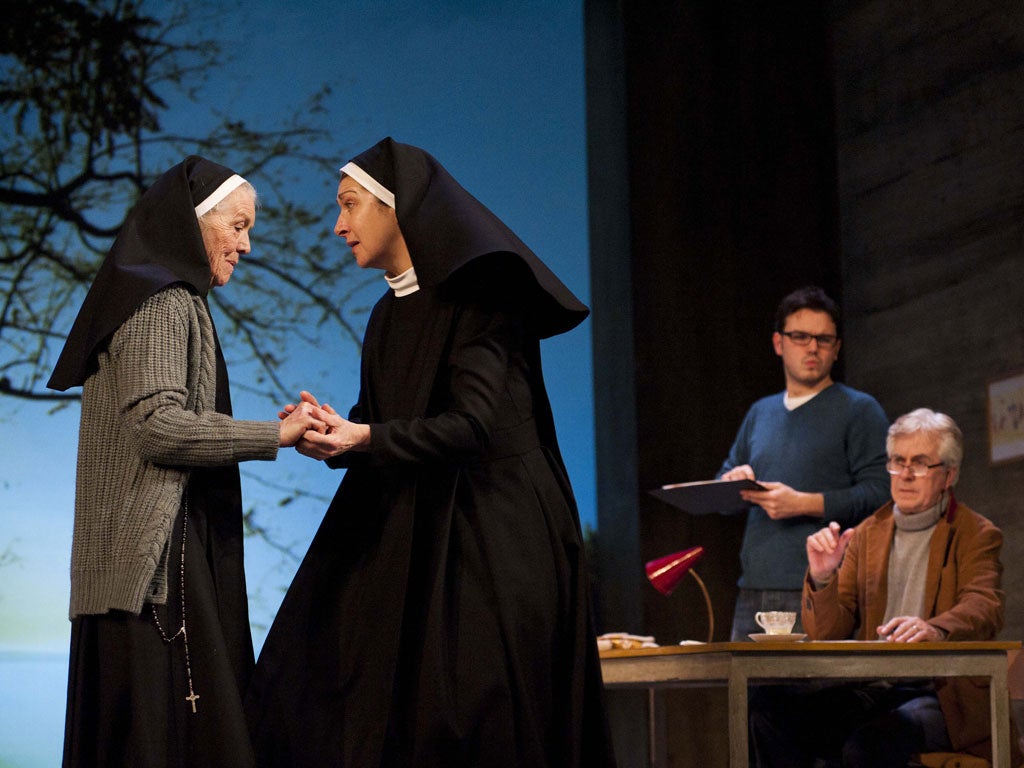27, Lyceum Theatre, Edinburgh
Abi Morgan’s superior study of hearts and minds restores the faith

Your support helps us to tell the story
This election is still a dead heat, according to most polls. In a fight with such wafer-thin margins, we need reporters on the ground talking to the people Trump and Harris are courting. Your support allows us to keep sending journalists to the story.
The Independent is trusted by 27 million Americans from across the entire political spectrum every month. Unlike many other quality news outlets, we choose not to lock you out of our reporting and analysis with paywalls. But quality journalism must still be paid for.
Help us keep bring these critical stories to light. Your support makes all the difference.
A convent on the west coast of Scotland. Life revolves around Countdown, lemonade on Fridays and the occasional takeaway burger. Women who read George Eliot polish doorknobs and defrost chicken as a daily sacrament. Into this repetitive existence come four scientists, British and American, conducting a longitudinal study into Alzheimer's. Several American convents have already signed up and the Brits are under pressure to recruit some subjects of their own. Nuns, with their identical lifestyles and meticulously recorded lives, are epidemiological catnip. The play's title is the number the Brits have managed to recruit. They are a precious, near-extinct resource.
Abi Morgan, hot property after the success of BBC drama The Hour, based 27 on American epidemiologist David Snowdon's "nun study" and some nuns she met on a train. It's a masterful piece of new theatre, dense with ideas, jumping with funny lines.
Before the research can proceed, the scientists must persuade the elderly Mother Superior, Sister Miriam, and her middle-aged heir apparent, Sister Ursula, that it's a good idea. For Miriam, the issue is a live one. Calm and twinkly when we first meet her, she is within the age-range for the proposed study. It will be her mental deterioration that the researchers point-score, her noviciate autobiography (the statement she wrote as a young girl entering the convent) that will be analysed for vocabulary and "idea density". If she agrees her brain will, as the gauche researcher Sam (a wonderfully dislikable Finn den Hertog) tactlessly puts it, be "removed, boxed and posted and be on a lab slide within six weeks" of her death.
It turns out that Ursula, a quicksilver Maureen Beattie, has a pressing personal interest in Alzheimer's. As time passes – 27 covers several years, cleverly indicated by the changing flowers on the coffee table – she struggles with her faith and watches the scientists as they watch the other sisters' deterioration. Her way of life is dying with them.
Beattie is a magnificent Ursula, clomping in dripping-haired after a swim, desperate not to be "the last nun standing, remote in hand, shouting quiz answers at the TV screen". Director Vicky Featherstone walks us through the science bit then stands well back as the powerful ensemble cast works out how the hell to deal with the massive, scary issues it raises.
To 12 November (0131 248 4848)
Join our commenting forum
Join thought-provoking conversations, follow other Independent readers and see their replies
Comments